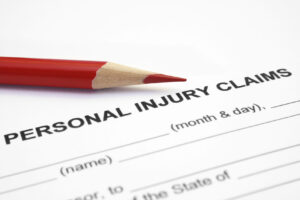
If you or a loved one has been injured in an accident in Illinois, you may be entitled to monetary damages. This compensation could cover medical bills, lost wages, pain and suffering, and more. Navigating the legal process can be complex and overwhelming. This is why it is important to have an experienced attorney on your side.
Below, we have answered some of the most frequently asked questions about personal injury cases. Use this guide to help you gain clarity if you have been injured and need to pursue justice. If you have additional questions or would like to discuss your case, don’t hesitate to contact our office for a free consultation.
What Is a Personal Injury Case?

A personal injury case arises when someone’s negligence, recklessness, or intentional actions cause harm to another. This harm can include physical injuries, emotional distress, or financial losses.
To have a valid personal injury claim in Illinois, you must prove the following elements:
- Duty of Care: The party at fault owed you a legal duty to act with reasonable care.
- Breach of Duty: The at-fault party failed to meet that duty of care.
- Causation: Their breach directly caused your injuries.
- Damages: You have suffered tangible harm, such as medical bills, lost wages, pain and suffering, or property damage.
Consulting with an experienced personal injury lawyer can help you assess your case and determine whether you have a valid claim.
What Are the Most Common Types of Personal Injury Cases?
Personal injury cases can arise from various types of accidents and situations. In Illinois, the most common personal injury cases include:
- Car accidents
- Truck accidents
- Motorcycle accidents
- Slip and fall accidents
- Dog bites
- Medical malpractice
- Product liability
- Workers’ compensation
- Wrongful death
Regardless of the type of accident or injury, a personal injury lawyer can help you pursue justice.
How Can a Personal Injury Lawyer Assist With My Case?
A personal injury lawyer can significantly improve the outcome of your case. With an experienced attorney by your side, you’ll receive expert legal advice and have someone who can handle all the legal complexities. Here’s how a lawyer can assist you:
- Investigating Your Accident: Your lawyer will gather evidence, review accident reports, and speak to witnesses to fully understand the circumstances surrounding your injury.
- Identifying Responsible Parties: Your lawyer will determine who is legally responsible for your injuries. This may include individuals, companies, or government entities.
- Explaining Your Legal Rights: Your lawyer will guide you through the legal process, making sure you understand your rights and how to proceed.
- Gathering Supporting Evidence: Your lawyer will collect all necessary evidence, including medical records, police reports, and anything else that will strengthen your case.
- Providing Legal Advice: Your lawyer will offer advice on the best course of action and help you understand the potential outcomes of your case.
- Negotiating a Settlement: Your lawyer will work with insurance companies to secure a fair settlement that covers your damages.
- Representing You in Court: If a fair settlement cannot be reached, your lawyer will take your case to court and fight for your rights in front of a judge and jury.
Having an experienced personal injury lawyer on your side can ensure that you don’t miss out on opportunities for compensation.
How Much Does It Cost to Hire a Personal Injury Lawyer?
Most personal injury lawyers operate on a contingency fee basis. This means you don’t pay any upfront fees or costs to get started. We only collect a fee if we successfully recover compensation for you. This arrangement allows you to focus on your recovery while we handle all the legal work.
Typically, personal injury lawyers take a percentage of the final settlement or verdict. This is usually between 33% to 40%. During your initial consultation, your personal injury lawyer will explain the fee structure so you understand exactly how it works.
What Is the Value of My Personal Injury Case?
The value of your personal injury case depends on several factors. These factors include the severity of your injuries and damages and how the accident has impacted your life. Common factors that determine the value of your case include:
- Medical Bills: The total cost of your medical bills, both current and future, will play a large role in determining the value of your case.
- Lost Income: If you’ve missed work due to your injuries, you may be entitled to compensation for lost wages.
- Pain and Suffering: Non-economic damages, like emotional distress, pain, and suffering, are also considered in determining the value of your case.
- Impact on Quality of Life: If your injuries have affected your ability to enjoy daily activities or have led to permanent disability, these factors will influence your case value.
- Property Damage: If your personal property was damaged during the accident (e.g., your vehicle), this may be factored into the value of your case.
- Emotional Distress: Compensation may also be available for anxiety, depression, PTSD, and other psychological effects caused by the accident.
Illinois law allows for recovery of both economic and non-economic damages. An experienced personal injury lawyer can help you understand the full value of your case.
Contact Kass & Moses Personal Injury Lawyers Today for a Free Consultation
If you or a loved one has been injured in an accident and you need legal representation, contact Kass & Moses Personal Injury Lawyers. Our experienced personal injury attorneys will guide you through the legal process and fight tirelessly to defend your rights.
Contact our office today at 847-513-9582 for a free consultation. Let us handle the legal details while you focus on your healing. We are committed to helping you achieve the very best outcome for your personal injury case.

